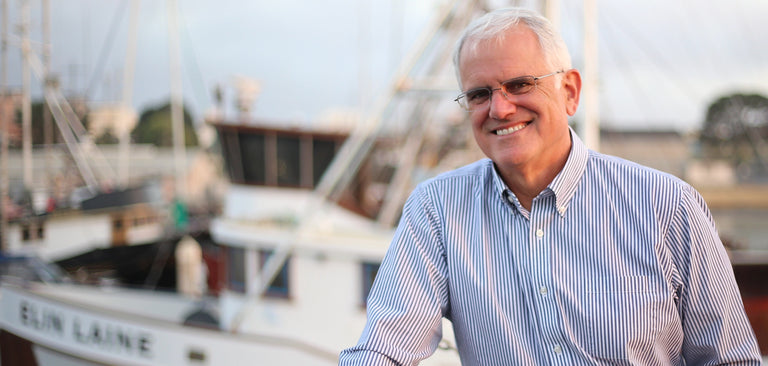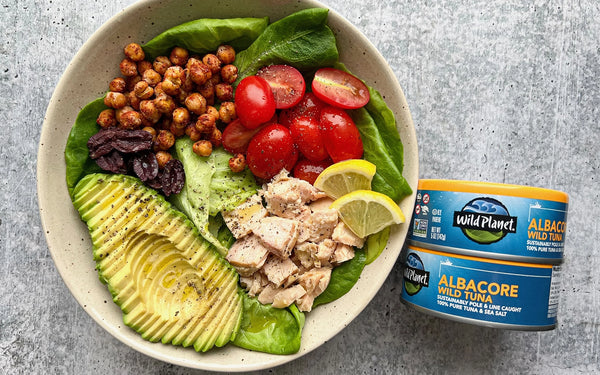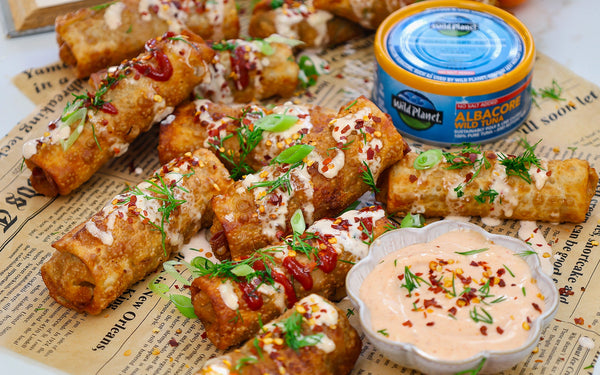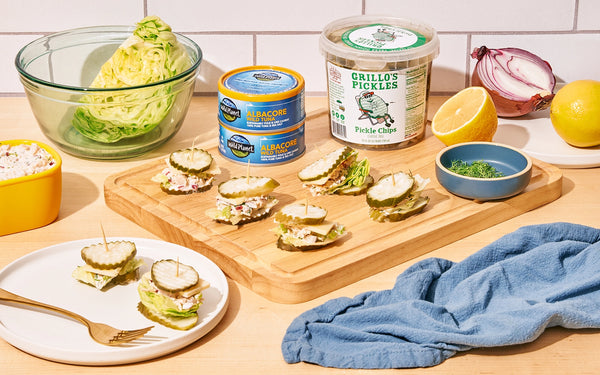
The relentless quest for cheap canned tuna is dismantling the ocean ecosystem. Tuna fishermen used to use binoculars to find schools of tuna. That tuna was caught sustainably with purse seine nets because the vessel caught mostly large tuna and not much else. Many smaller-scale fishermen around the world still fish that way. However, in recent decades, many large-scale tuna fishermen have turned into ‘tuna trappers.’ ‘Tuna trappers’ no longer go out fishing with the uncertainty of finding a school of tuna. Rather, the trapper sets dozens of floating devices and waits for fish to congregate under each one of them. These traps are called FADs (Fish Aggregating Devices).

Example shown above: FAD being used to catch tiny juvenile tuna and small to medium-sized fish, along with larger predators like sharks, whales and turtles
The first tuna to be drawn to these FADs are tiny juveniles (weighing only a few pounds each) seeking a protective habitat. With the FAD tuna snare, the fish are never given a chance to grow to maturity, thereby preventing the natural growth that would have yielded hundreds of millions of incremental pounds of much needed tuna.
Bluntly speaking, this is tuna infanticide. Furthermore, the floating FAD also attracts nearly all other sea animals within a radius of many miles to join the gathering. These include sharks, turtles, yellowtail, mahi mahi, and dozens of other species. These fish all assemble under the FAD’s death trap. The FADs are equipped with location beacons and many have sonar to communicate the concentration of fish below. The fisherman is practically guaranteed a big haul as he travels to the FAD and encircles the entire mass in his net. The fish are then crowded to the boat and brought on board. The tuna is kept and the rest of the animals are discarded overboard, most already dead. For every ton of tuna taken, hundreds of pounds of other magnificent ocean creatures are dumped. Annually the cumulative figure of this waste is in the hundreds of millions of pounds.
This bycatch mortality is simply unacceptable as these discarded creatures are all essential to maintaining a diverse, environmentally healthy ecosystem.
To be fair, it must be stated that many of these fishermen would prefer not to use FADs, but the prevalence of the practice forces them to do so in order to compete. Why is this done? To make cheap canned light tuna. Boats are more efficient when they concentrate the fish under the FADs, travel straight to the location and take them, one deadly FAD after another. The fishermen can afford to sell for less. The big tuna brands pay less now for skipjack tuna than they did years ago. And the $1.00 can of tuna lives on…for now. As long as consumers continue to choose those products, the ecological tragedy will go unstopped.
Ultimately, consumers become unsuspecting accomplices when they use their purchasing dollars to support this activity. There is a dire need for change in the tuna industry. There are numerous brands, including Wild Planet, dedicated to selling only sustainable tuna. In 2001, as an industry insider, I converted to selling only “eco-friendly” products as defined by the Monterey Bay Aquarium Seafood Watch Program (the word sustainable wasn’t in use yet). In 2004, I changed the name of our pole and line caught tuna brand to Wild Planet. Since then, Wild Planet has become the leading sustainably sourced tuna brand and is now the fourth largest brand in the U.S. In March of 2017, Greenpeace ranked Wild Planet, #1 in sustainable sourcing policy, a spot we’ve enjoyed since the ranking began.

Wild Planet applauds the tireless efforts of Greenpeace, which have effectively promoted consumer and retailer awareness of sustainable tuna practices. Wild Planet also congratulates other tuna brands that have begun selling pole and line tuna. By buying only tuna that says “pole and line caught,” consumers can now choose not to support eco-deadly, cheap tuna. Brands working to provide tuna from vessels that have converted 100% to FAD-free fishing are also part of the solution.

Example shown above: pole and line caught tuna fishing
Cheap tuna may seem like a good deal, but do not forget that it is subsidized by environmentally deadly practices. The true cost of cheap tuna is the destruction of our oceans’ ability to sustain life – an astronomically high price indeed.
Want to take action? Continue shopping sustainably and challenge others, retailers included, to do the same.




